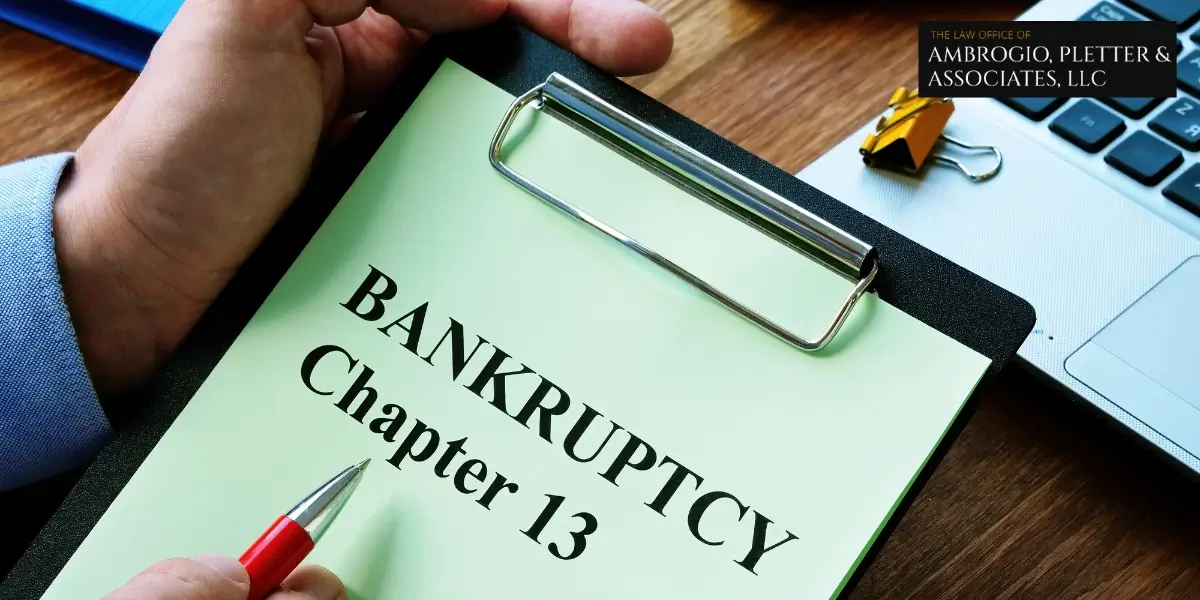A: In Connecticut, a Chapter 13 bankruptcy allows anyone to seek a fresh financial start by proposing a repayment plan to pay back their owed debts. Generally, this repayment plan lasts between three and five years. The amount you’re required to pay back is calculated by the means test. There are multiple benefits to filing for a Chapter 13 bankruptcy. Many people opt for this form of bankruptcy to remove a lien or stop a foreclosure on their home.
Milford Chapter 13 Bankruptcy Lawyer
Milford Chapter 13 Bankruptcy Attorney

Bankruptcy Attorney Tim Pletter has been helping residents get out of debt across Connecticut since 1995. If you’ve found yourself buried in debt, don’t hesitate to speak with a seasoned Milford Chapter 13 bankruptcy lawyer. Ambrogio, Pletter & Associates, LLC, has decades of experience in bankruptcy law. We guide struggling individuals and their families out of overwhelming financial circumstances.
Contact Our Stratford
Bankruptcy Attorneys Today
To learn more about the benefits of bankruptcy and loan modifications
Looking at Bankruptcy Cases in Milford, CT
In 2023, there were approximately 2,900 bankruptcy filings in total reported in Connecticut. This is slightly higher than the number of Connecticut bankruptcy filings in the previous year, which was 2,512 filings. Of the 2023 bankruptcy filings, an estimated 567 cases involved a Chapter 13 bankruptcy petition.
Bankruptcy filings and other important paperwork or court actions go through the United States Bankruptcy Court. For such cases in Milford, CT, you and your skilled bankruptcy attorney will mainly interact with its District of Connecticut venue, particularly at the New Haven divisional office. This is located at the Connecticut Financial Center at 157 Church Street, 18th Floor, New Haven, CT 06510.
What Is a Chapter 13 Bankruptcy in Milford, CT?
Most people struggle with various debts at some point in their lives, whether it’s because of a sudden injury or sickness, losing a job, or another common life obstacle. When such stressful problems arise and you’re looking for a debt relief option, it might be worth considering filing for bankruptcy. Bankruptcy is a legal process wherein a person who can’t keep repaying their debts can file a court petition to give them a fresh financial start.
Under the Chapter 13 bankruptcy procedure, sometimes called a “wage earner’s bankruptcy,” you will file a proposal plan with the bankruptcy court. This plan outlines how you plan to pay back your mortgage payments and other debts over a multi-year period, generally between three and five years.
Chapter 13 bankruptcy is known as a wage earner’s bankruptcy because it’s typically the ideal option for individuals who earn a regular income but can’t pay their debts. In addition to addressing your owed debts, there are several other benefits to filing for bankruptcy, such as:
- Any foreclosures are immediately stopped.
- It removes any liens placed on your house.
- Garnishments to your wages are halted.
- Repossession of your car is stopped.
- It stops creditors from harassing you.
- It improves your credit with the help of the payment plan.
- It reduces the interest rates of your unsecured debts, mortgages, and credit cards.
Chapter 13 Filings as a Reorganization Bankruptcy
Under a Chapter 13 bankruptcy, you propose a repayment plan to resolve a portion of your delinquent debts. There are a few key differences between Chapter 7 and Chapter 13 bankruptcy that people should keep in mind, particularly when it comes to how debt is discharged and which assets a person may keep. The amount of your repayment installments is determined by the “means test” and the value of your personal assets. This means test determines whether you qualify for a Chapter 7 bankruptcy, but it is also useful in Chapter 13 filings.
The means test begins by checking whether your household’s monthly income in Milford, Connecticut is above or below the state’s median income, according to your family size. If your total monthly wages are higher than this threshold, it then calculates how much money you have left every month after deducting various expenses. These include standard living costs, your secured debts, and priority debt payments.
FAQs About Milford, CT Chapter 13 Bankruptcy Laws
Speak to Our Adept Milford Bankruptcy Attorneys
At Ambrogio, Pletter & Associates, LLC, we can help anyone considering bankruptcy as an answer to financial strife. After looking over the details of your situation, we will determine which bankruptcy or other debt relief option is ideal for you. Contact our office today to schedule an initial consultation.
Take Action Today & Begin Moving Forward
Attorney Tim Pletter works directly with his clients, and most of your contact will be directly with him. Please contact our Stratford, Connecticut, office today to arrange your free consultation


